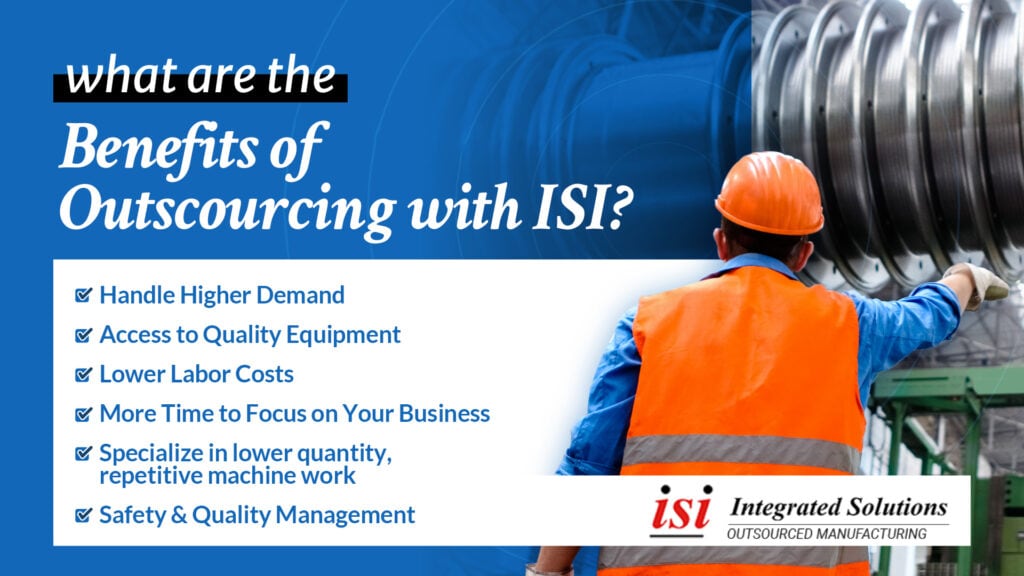Outsourcing your manufacturing processes can provide ample benefits to your company, saving money and time while increasing efficiency in bringing your product to market. With some research on your part, you can find the right manufacturer and navigate the request for proposal process to find an outsourcing solution that meets your needs.

What Is Outsource Manufacturing? What Are the Benefits of Outsourcing?
Outsourcing manufacturing means partnering with an outside company to produce your product or product components. Outsourcing can help your company remain competitive by keeping up with high demand, lowering labor costs, and eliminating the struggle to find skilled labor. Working with a manufacturing and outsourcing company provides immediate expertise in your needed field.
Outsource manufacturing also provides access to state-of-the-art equipment without investing your resources. The manufacturer already has the machinery as well as safety and quality standards in place. The outsource manufacturer should be able to scale operations to fit your needs, even if they change over time. While all of this is occurring as part of a consolidated, efficient process with the outside manufacturer, your company can instead focus on your core business and what you do best.
Finding an Outsource Manufacturer
When looking for an outsource manufacturer, research carefully to find a company with mutual interests that will protect the quality of your brand. Consider the following:
- Available services. The manufacturer’s capabilities should fit your project’s requirements.
- Budget. Determine the cost per part to see if the outsourcing partner can meet your budget and reduce overall costs.
- Equipment and technology. Inspect the manufacturer’s current machinery and processes, and ask if they are willing to upgrade if needed.
- Lead times and delivery. Review the manufacturer’s ability to consistently produce and deliver products on time.
- Licenses and certifications. Contract with manufacturers that hold the correct legal documentation to conduct business.
- Minimum orders. Confirm if the manufacturer requires a certain minimum order and if that fits with your business plan.
- Point of contact. Find out who your point of contact would be to ensure their communication style meets your expectations.
- Quality standards. Request a sample product to inspect the manufacturer’s work.
- Scale. Examine the manufacturer’s ability to produce your product at the current volumes as well as larger or smaller future production runs.
- Testing. Ask if the manufacturer tests the final product and how they handle defects.
Navigating the Request for Proposal Process
When you have found a suitable manufacturer, the next step is to draft a request for proposal (RFP). An RFP is a procurement document that goes out to bidders to outline your project and company needs as well as the criteria you will use to determine a winning bidder. Drafting a detailed, precise RFP takes time, but the process will also save time by helping to ensure that your product will be manufactured as intended once production begins.
Start planning your RFP by selecting your team, generating a timeline and a list of the planned bidders, developing the requirements for your project, and determining the winning criteria. When the planning is complete, you will draft the document formally for the team to review, ensuring it includes all necessary information. After any improvements based on the team’s feedback, the RFP goes to the primary stakeholders for approval.
Once the RFP is final, the team sends it to the bidders, allowing them the opportunity to request an RFP conference and submission support, if necessary. When the bidders’ responses are in, you will evaluate them based on the criteria set in the planning stage. After you choose the ideal proposal, you can announce the winner and draft a Statement of Work for the winning bidder so that manufacturing can proceed.
Integrated Solutions’ (ISI) Outsourcing Solutions
Outsourcing your manufacturing can be an advantageous venture, but it is vital to find a manufacturer that meets your unique needs. Integrated Solutions Co. has been delivering manufacturing solutions to companies in the United States and Canada since 2002. As an overseas outsourcing company, ISI can reduce your labor costs and produce consistent, high-quality parts, regardless of the material or industry. We offer standard machine shop services, including turning and milling; machined components made of various materials like fiberglass, rubber, and plastic; and even language support.
Let our experts save you time and money with a seamless outsourcing process. Contact us to learn more, or request a quote today.
